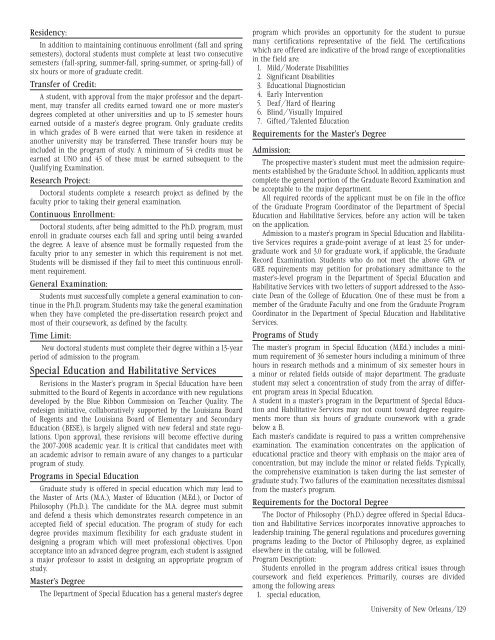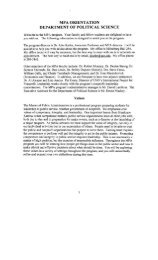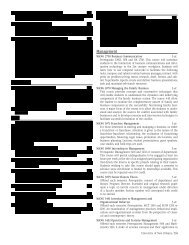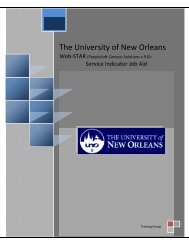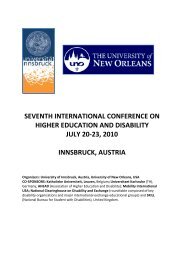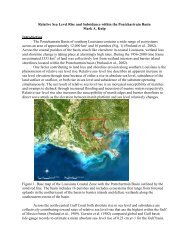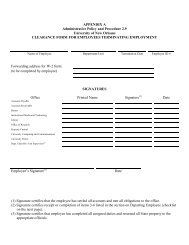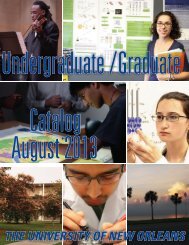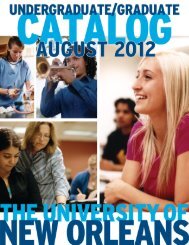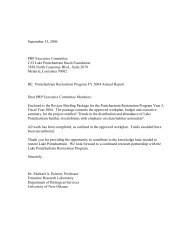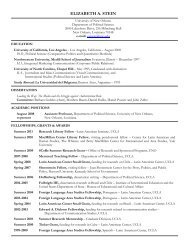Untitled - University of New Orleans
Untitled - University of New Orleans
Untitled - University of New Orleans
You also want an ePaper? Increase the reach of your titles
YUMPU automatically turns print PDFs into web optimized ePapers that Google loves.
Residency:<br />
In addition to maintaining continuous enrollment (fall and spring<br />
semesters), doctoral students must complete at least two consecutive<br />
semesters (fall-spring, summer-fall, spring-summer, or spring-fall) <strong>of</strong><br />
six hours or more <strong>of</strong> graduate credit.<br />
Transfer <strong>of</strong> Credit:<br />
A student, with approval from the major pr<strong>of</strong>essor and the department,<br />
may transfer all credits earned toward one or more master’s<br />
degrees completed at other universities and up to 15 semester hours<br />
earned outside <strong>of</strong> a master’s degree program. Only graduate credits<br />
in which grades <strong>of</strong> B were earned that were taken in residence at<br />
another university may be transferred. These transfer hours may be<br />
included in the program <strong>of</strong> study. A minimum <strong>of</strong> 54 credits must be<br />
earned at UNO and 45 <strong>of</strong> these must be earned subsequent to the<br />
Qualifying Examination.<br />
Research Project:<br />
Doctoral students complete a research project as defined by the<br />
faculty prior to taking their general examination.<br />
Continuous Enrollment:<br />
Doctoral students, after being admitted to the Ph.D. program, must<br />
enroll in graduate courses each fall and spring until being awarded<br />
the degree. A leave <strong>of</strong> absence must be formally requested from the<br />
faculty prior to any semester in which this requirement is not met.<br />
Students will be dismissed if they fail to meet this continuous enrollment<br />
requirement.<br />
General Examination:<br />
Students must successfully complete a general examination to continue<br />
in the Ph.D. program. Students may take the general examination<br />
when they have completed the pre-dissertation research project and<br />
most <strong>of</strong> their coursework, as defined by the faculty.<br />
Time Limit:<br />
<strong>New</strong> doctoral students must complete their degree within a 13-year<br />
period <strong>of</strong> admission to the program.<br />
Special Education and Habilitative Services<br />
Revisions in the Master’s program in Special Education have been<br />
submitted to the Board <strong>of</strong> Regents in accordance with new regulations<br />
developed by the Blue Ribbon Commission on Teacher Quality. The<br />
redesign initiative, collaboratively supported by the Louisiana Board<br />
<strong>of</strong> Regents and the Louisiana Board <strong>of</strong> Elementary and Secondary<br />
Education (BESE), is largely aligned with new federal and state regulations.<br />
Upon approval, these revisions will become effective during<br />
the 2007-2008 academic year. It is critical that candidates meet with<br />
an academic advisor to remain aware <strong>of</strong> any changes to a particular<br />
program <strong>of</strong> study.<br />
Programs in Special Education<br />
Graduate study is <strong>of</strong>fered in special education which may lead to<br />
the Master <strong>of</strong> Arts (M.A.), Master <strong>of</strong> Education (M.Ed.), or Doctor <strong>of</strong><br />
Philosophy (Ph.D.). The candidate for the M.A. degree must submit<br />
and defend a thesis which demonstrates research competence in an<br />
accepted field <strong>of</strong> special education. The program <strong>of</strong> study for each<br />
degree provides maximum flexibility for each graduate student in<br />
designing a program which will meet pr<strong>of</strong>essional objectives. Upon<br />
acceptance into an advanced degree program, each student is assigned<br />
a major pr<strong>of</strong>essor to assist in designing an appropriate program <strong>of</strong><br />
study.<br />
Master’s Degree<br />
The Department <strong>of</strong> Special Education has a general master’s degree<br />
program which provides an opportunity for the student to pursue<br />
many certifications representative <strong>of</strong> the field. The certifications<br />
which are <strong>of</strong>fered are indicative <strong>of</strong> the broad range <strong>of</strong> exceptionalities<br />
in the field are:<br />
1. Mild/Moderate Disabilities<br />
2. Significant Disabilities<br />
3. Educational Diagnostician<br />
4. Early Intervention<br />
5. Deaf/Hard <strong>of</strong> Hearing<br />
6. Blind/Visually Impaired<br />
7. Gifted/Talented Education<br />
Requirements for the Master’s Degree<br />
Admission:<br />
The prospective master’s student must meet the admission requirements<br />
established by the Graduate School. In addition, applicants must<br />
complete the general portion <strong>of</strong> the Graduate Record Examination and<br />
be acceptable to the major department.<br />
All required records <strong>of</strong> the applicant must be on file in the <strong>of</strong>fice<br />
<strong>of</strong> the Graduate Program Coordinator <strong>of</strong> the Department <strong>of</strong> Special<br />
Education and Habilitative Services, before any action will be taken<br />
on the application.<br />
Admission to a master’s program in Special Education and Habilitative<br />
Services requires a grade-point average <strong>of</strong> at least 2.5 for undergraduate<br />
work and 3.0 for graduate work, if applicable, the Graduate<br />
Record Examination. Students who do not meet the above GPA or<br />
GRE requirements may petition for probationary admittance to the<br />
master’s-level program in the Department <strong>of</strong> Special Education and<br />
Habilitative Services with two letters <strong>of</strong> support addressed to the Associate<br />
Dean <strong>of</strong> the College <strong>of</strong> Education. One <strong>of</strong> these must be from a<br />
member <strong>of</strong> the Graduate Faculty and one from the Graduate Program<br />
Coordinator in the Department <strong>of</strong> Special Education and Habilitative<br />
Services.<br />
Programs <strong>of</strong> Study<br />
The master’s program in Special Education (M.Ed.) includes a minimum<br />
requirement <strong>of</strong> 36 semester hours including a minimum <strong>of</strong> three<br />
hours in research methods and a minimum <strong>of</strong> six semester hours in<br />
a minor or related fields outside <strong>of</strong> major department. The graduate<br />
student may select a concentration <strong>of</strong> study from the array <strong>of</strong> different<br />
program areas in Special Education.<br />
A student in a master’s program in the Department <strong>of</strong> Special Education<br />
and Habilitative Services may not count toward degree requirements<br />
more than six hours <strong>of</strong> graduate coursework with a grade<br />
below a B.<br />
Each master’s candidate is required to pass a written comprehensive<br />
examination. The examination concentrates on the application <strong>of</strong><br />
educational practice and theory with emphasis on the major area <strong>of</strong><br />
concentration, but may include the minor or related fields. Typically,<br />
the comprehensive examination is taken during the last semester <strong>of</strong><br />
graduate study. Two failures <strong>of</strong> the examination necessitates dismissal<br />
from the master’s program.<br />
Requirements for the Doctoral Degree<br />
The Doctor <strong>of</strong> Philosophy (Ph.D.) degree <strong>of</strong>fered in Special Education<br />
and Habilitative Services incorporates innovative approaches to<br />
leadership training. The general regulations and procedures governing<br />
programs leading to the Doctor <strong>of</strong> Philosophy degree, as explained<br />
elsewhere in the catalog, will be followed.<br />
Program Description:<br />
Students enrolled in the program address critical issues through<br />
coursework and field experiences. Primarily, courses are divided<br />
among the following areas:<br />
1. special education,<br />
<strong>University</strong> <strong>of</strong> <strong>New</strong> <strong>Orleans</strong>/129


